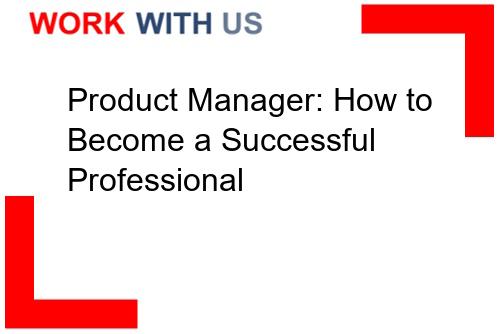A product manager is a crucial role within any organization, responsible for overseeing the development and success of a product from conception to launch. They are the driving force behind a product’s strategy, ensuring that it meets the needs of the target market and aligns with the company’s overall goals. Becoming a successful product manager requires a unique combination of skills, knowledge, and experience. This article will explore the key steps and qualities necessary to excel in this challenging yet rewarding profession.
First and foremost, a successful product manager must possess a deep understanding of the market and the customers they serve. They must be able to identify market trends, anticipate customer needs, and stay ahead of the competition. This requires continuous research and analysis, staying up-to-date with industry news, and engaging with customers to gather feedback and insights. By having a finger on the pulse of the market, a product manager can make informed decisions that drive the success of their product.
In addition to market knowledge, a successful product manager must also possess strong leadership and communication skills. They are responsible for leading cross-functional teams, including engineers, designers, marketers, and salespeople, to ensure the successful development and launch of a product. Effective communication is essential in aligning these teams, setting clear goals and expectations, and fostering collaboration. A product manager must be able to articulate their vision, motivate their team, and navigate any challenges that arise along the way.
Furthermore, a successful product manager must be highly organized and detail-oriented. They are responsible for managing multiple projects simultaneously, juggling competing priorities, and meeting tight deadlines. By effectively managing their time and resources, a product manager can ensure that all aspects of the product’s development are on track. Attention to detail is also crucial in identifying potential issues or risks early on, allowing for timely mitigation and preventing any negative impact on the product’s success.
Another important quality of a successful product manager is adaptability. The landscape of technology and consumer preferences is constantly evolving, and a product manager must be able to adapt their strategies and plans accordingly. They must be open to feedback, willing to pivot when necessary, and continuously iterate on their product to meet changing market demands. By embracing change and being flexible, a product manager can stay ahead of the curve and drive the ongoing success of their product.
Lastly, a successful product manager must have a passion for their product and a genuine desire to make a positive impact. They must be customer-centric, always putting the needs and desires of their target market at the forefront of their decision-making. By truly understanding and empathizing with their customers, a product manager can create products that not only meet their needs but also exceed their expectations.
In conclusion, becoming a successful product manager requires a combination of skills, knowledge, and experience. By possessing a deep understanding of the market, strong leadership and communication skills, organizational abilities, adaptability, and a passion for their product, a product manager can excel in this challenging role. With dedication and continuous learning, aspiring professionals can embark on a rewarding career as a successful product manager.
The essential skills and qualities of a successful product manager
A successful product manager possesses a myriad of essential skills and qualities that enable them to excel in their role. One of the key attributes of a successful product manager is their ability to effectively communicate and collaborate with various stakeholders. They must possess exceptional interpersonal skills to build strong relationships with cross-functional teams, including engineers, designers, marketers, and executives.
In addition to strong communication skills, a successful product manager must also have a deep understanding of the market and the needs of the customers. They should be able to conduct thorough market research, analyze customer feedback, and identify trends to make informed decisions about product development and strategy. By staying attuned to the market, they can ensure that the product meets the evolving needs and preferences of the target audience.
Furthermore, a successful product manager must possess excellent problem-solving and analytical skills. They should be able to identify and address potential obstacles or challenges that may arise during the product development process. By analyzing data and conducting thorough research, they can make data-driven decisions and mitigate risks effectively. Their ability to think critically and find innovative solutions is crucial in ensuring the success of the product.
Adaptability is another essential quality of a successful product manager. They must be able to navigate through changing circumstances and adjust their strategies accordingly. The ability to embrace change and quickly adapt to new technologies, market trends, and customer demands is vital in the fast-paced world of product management. By being flexible and open-minded, they can lead their teams through uncertainty and drive successful outcomes.
A successful product manager should also possess strong leadership skills. They must be able to inspire and motivate their team members, fostering a collaborative and high-performing work environment. By setting clear goals and expectations, providing guidance, and recognizing achievements, they can empower their team to deliver exceptional results. Effective leadership also involves the ability to make tough decisions and take responsibility for the outcomes.
Moreover, a successful product manager must have a keen eye for detail and a commitment to quality. They should be meticulous in their approach, ensuring that every aspect of the product meets the highest standards. By paying attention to even the smallest details, they can deliver a product that exceeds customer expectations and stands out in the market.
In addition to these skills and qualities, a successful product manager must possess a strong business acumen. They should have a solid understanding of financial principles, market dynamics, and competitive landscape. By aligning the product strategy with the overall business goals, they can drive revenue growth and maximize profitability.
Lastly, a successful product manager must be passionate about their work. They should have a genuine interest in the product they are managing and a desire to make a positive impact on the lives of the customers. Passion fuels their drive to overcome challenges, continuously improve, and deliver exceptional products that resonate with the target audience.
In conclusion, a successful product manager possesses a diverse range of skills and qualities that enable them to excel in their role. From effective communication and collaboration to market understanding, problem-solving, adaptability, leadership, attention to detail, business acumen, and passion, these attributes collectively contribute to their success. By continuously honing these skills and qualities, a product manager can navigate the complexities of product development, drive innovation, and achieve remarkable results.
Mastering the art of product strategy and roadmapping
crucial for any organization aiming to stay competitive in today’s fast-paced business landscape. A well-defined product strategy and roadmap provide a clear direction for the development and evolution of a company’s products, ensuring alignment with market needs and customer expectations. This comprehensive and exhaustive text will delve into the intricacies of product strategy and roadmapping, exploring various interesting topics that can help businesses excel in this domain.
The Importance of Product Strategy
Product strategy serves as a guiding light for organizations, helping them make informed decisions about their product offerings. It involves defining the long-term vision, goals, and objectives for a product or product portfolio. A robust product strategy considers market trends, customer insights, and competitive analysis to identify opportunities and define a unique value proposition. By aligning the product strategy with the overall business strategy, companies can ensure that their products contribute to the organization’s growth and success.
Crafting an Effective Product Roadmap
A product roadmap is a visual representation of the product strategy, outlining the planned features, enhancements, and milestones over a specific time frame. It provides a high-level overview of the product’s evolution, enabling stakeholders to understand the product’s direction and progress. A well-crafted product roadmap considers factors such as market demands, technological advancements, and resource availability. It helps prioritize initiatives, allocate resources effectively, and communicate the product vision to internal teams and external stakeholders.
Aligning Product Strategy with Customer Needs
Understanding customer needs and preferences is paramount in developing a successful product strategy. Conducting market research, gathering customer feedback, and analyzing user data are essential steps in identifying pain points and unmet needs. By aligning the product strategy with these insights, organizations can develop products that resonate with their target audience. Regularly engaging with customers through surveys, interviews, and usability testing can provide valuable feedback for refining the product strategy and ensuring continuous improvement.
Balancing Innovation and Market Fit
One of the key challenges in product strategy is striking the right balance between innovation and market fit. While innovation drives differentiation and competitive advantage, it must be tempered with a deep understanding of the target market. A product strategy that focuses solely on innovation without considering market demand may result in products that fail to gain traction. Conversely, a strategy solely based on market fit may lead to incremental improvements without addressing evolving customer needs. Successful product strategies find the sweet spot between innovation and market fit, delivering products that are both groundbreaking and commercially viable.
Iterative and Agile Approach to Roadmapping
In today’s dynamic business environment, a rigid and inflexible product roadmap can hinder an organization’s ability to adapt to changing market conditions. Adopting an iterative and agile approach to roadmapping allows for flexibility and responsiveness. This involves breaking down the product roadmap into smaller, manageable increments or sprints, allowing for regular reassessment and adjustment based on market feedback and emerging opportunities. By embracing an iterative approach, organizations can quickly adapt their product strategy and roadmap to stay ahead of the competition and meet evolving customer needs.
is a continuous journey that requires a deep understanding of market dynamics, customer needs, and organizational goals. By crafting an effective product strategy, aligning it with customer needs, balancing innovation and market fit, and adopting an iterative and agile approach to roadmapping, organizations can position themselves for success in today’s competitive landscape. Embracing these principles and continuously refining the product strategy and roadmap will enable businesses to deliver products that delight customers, drive growth, and stay ahead of the curve.
Effective communication and collaboration: key to product manager success
Effective communication and collaboration play a pivotal role in the success of product managers. These two key factors enable product managers to effectively navigate the complex landscape of product development, ensuring that projects are delivered on time, within budget, and meet customer expectations. By fostering open lines of communication and promoting collaboration among team members, product managers can streamline processes, enhance productivity, and drive innovation.
One of the primary reasons why effective communication is crucial for product manager success is its ability to align stakeholders and team members towards a common goal. Through clear and concise communication, product managers can articulate their vision, objectives, and expectations to all parties involved. This ensures that everyone is on the same page and working towards a shared understanding of the project’s goals and requirements.
Moreover, effective communication allows product managers to actively listen to the needs and concerns of their team members, stakeholders, and customers. By actively listening, product managers can gain valuable insights and feedback, which can be used to refine product strategies and make informed decisions. This collaborative approach fosters a sense of ownership and engagement among team members, leading to increased motivation and productivity.
In addition to communication, collaboration is equally essential for product manager success. Collaboration brings together diverse perspectives, skills, and expertise, enabling product managers to leverage the collective intelligence of their teams. By encouraging collaboration, product managers can tap into the creativity and problem-solving abilities of their team members, resulting in innovative solutions and improved product outcomes.
Collaboration also helps in breaking down silos and fostering cross-functional teamwork. Product managers often work with various departments, such as engineering, design, marketing, and sales. By promoting collaboration among these teams, product managers can ensure that all aspects of product development are considered and integrated seamlessly. This holistic approach leads to a more cohesive and well-rounded product, which ultimately enhances customer satisfaction.
Furthermore, effective communication and collaboration enable product managers to effectively manage project timelines and resources. By maintaining open lines of communication, product managers can identify potential bottlenecks or challenges early on and take proactive measures to address them. This proactive approach helps in minimizing delays and maximizing efficiency throughout the product development lifecycle.
Additionally, effective communication and collaboration facilitate effective decision-making. By involving all relevant stakeholders and team members in the decision-making process, product managers can gather diverse perspectives and insights. This collaborative decision-making approach ensures that decisions are well-informed, balanced, and aligned with the overall project objectives.
To enhance communication and collaboration, product managers can utilize various tools and techniques. Project management software, communication platforms, and collaborative tools can streamline communication channels and facilitate real-time collaboration. Regular team meetings, brainstorming sessions, and workshops can also foster a culture of open communication and collaboration.
In conclusion, effective communication and collaboration are indispensable for the success of product managers. By establishing clear lines of communication, actively listening, and promoting collaboration, product managers can align stakeholders, leverage diverse perspectives, manage resources efficiently, and make informed decisions. These key factors not only enhance productivity and innovation but also contribute to the overall success of product development initiatives. Therefore, product managers should prioritize effective communication and collaboration as essential skills in their professional toolkit.
Navigating the challenges: tips for overcoming obstacles as a product manager
Being a product manager is no easy task. It requires a unique set of skills and the ability to navigate through various challenges that come your way. From managing stakeholders to prioritizing tasks, a product manager must be adept at overcoming obstacles to ensure the success of their product. Here are some tips to help product managers overcome these challenges and excel in their role.
Building strong relationships with stakeholders
One of the biggest challenges for a product manager is managing stakeholders. These stakeholders can include executives, developers, designers, and customers. Building strong relationships with each of these stakeholders is crucial for the success of the product. A product manager should take the time to understand the needs and expectations of each stakeholder and communicate effectively with them. By establishing trust and open lines of communication, a product manager can navigate through conflicting priorities and ensure that everyone is aligned towards a common goal.
Prioritizing tasks effectively
Another challenge that product managers face is prioritizing tasks. With limited resources and competing demands, it can be difficult to determine which tasks should take precedence. To overcome this challenge, a product manager should have a clear understanding of the product vision and goals. They should also gather input from stakeholders and use data-driven insights to make informed decisions. By prioritizing tasks effectively, a product manager can ensure that the most important and impactful work is being done.
Adapting to changing market conditions
The market is constantly evolving, and product managers must be able to adapt to these changes. Whether it’s a shift in customer preferences or the emergence of new competitors, product managers need to stay ahead of the curve. They should continuously monitor the market, gather feedback from customers, and analyze data to identify trends and opportunities. By staying agile and proactive, product managers can navigate through changing market conditions and make informed decisions to keep their product competitive.
Managing conflicts and resolving issues
Conflicts and issues are inevitable in any project, and product managers must be skilled at managing them. Whether it’s a disagreement between team members or a technical challenge, a product manager should be able to address conflicts and resolve issues effectively. This requires strong communication and problem-solving skills. A product manager should listen to all parties involved, facilitate open discussions, and find creative solutions that satisfy everyone’s needs. By effectively managing conflicts and resolving issues, a product manager can keep the project on track and maintain a positive team dynamic.
Continuously learning and improving
Lastly, a successful product manager is always learning and improving. The field of product management is constantly evolving, and it’s important for product managers to stay updated on industry trends and best practices. They should seek out opportunities for professional development, attend conferences and workshops, and network with other product managers. By continuously learning and improving their skills, product managers can stay ahead of the game and overcome any challenges that come their way.
In conclusion, being a product manager comes with its fair share of challenges. However, by building strong relationships with stakeholders, prioritizing tasks effectively, adapting to changing market conditions, managing conflicts and resolving issues, and continuously learning and improving, product managers can navigate through these obstacles and excel in their role. It takes a combination of skills, experience, and a proactive mindset to overcome these challenges and ensure the success of a product. With the right approach, a product manager can turn obstacles into opportunities and drive the growth and success of their product.



